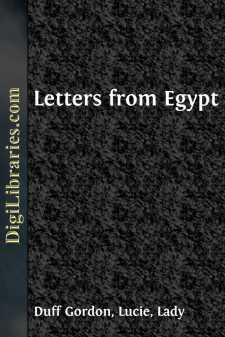Categories
- Antiques & Collectibles 13
- Architecture 36
- Art 48
- Bibles 22
- Biography & Autobiography 813
- Body, Mind & Spirit 138
- Business & Economics 28
- Children's Books 12
- Children's Fiction 9
- Computers 4
- Cooking 94
- Crafts & Hobbies 4
- Drama 346
- Education 46
- Family & Relationships 57
- Fiction 11821
- Games 19
- Gardening 17
- Health & Fitness 34
- History 1377
- House & Home 1
- Humor 147
- Juvenile Fiction 1873
- Juvenile Nonfiction 202
- Language Arts & Disciplines 88
- Law 16
- Literary Collections 686
- Literary Criticism 179
- Mathematics 13
- Medical 41
- Music 40
- Nature 179
- Non-Classifiable 1768
- Performing Arts 7
- Periodicals 1453
- Philosophy 64
- Photography 2
- Poetry 896
- Political Science 203
- Psychology 42
- Reference 154
- Religion 505
- Science 126
- Self-Help 81
- Social Science 81
- Sports & Recreation 34
- Study Aids 3
- Technology & Engineering 59
- Transportation 23
- Travel 463
- True Crime 29
Letters from Egypt
Categories:
Description:
Excerpt
INTRODUCTION
The letters of Lady Duff Gordon are an introduction to her in person. She wrote as she talked, and that is not always the note of private correspondence, the pen being such an official instrument. Readers growing familiar with her voice will soon have assurance that, addressing the public, she would not have blotted a passage or affected a tone for the applause of all Europe. Yet she could own to a liking for flattery, and say of the consequent vanity, that an insensibility to it is inhuman. Her humour was a mouthpiece of nature. She inherited from her father the judicial mind, and her fine conscience brought it to bear on herself as well as on the world, so that she would ask, ‘Are we so much better?’ when someone supremely erratic was dangled before the popular eye. She had not studied her Goethe to no purpose. Nor did the very ridiculous creature who is commonly the outcast of all compassion miss having the tolerant word from her, however much she might be of necessity in the laugh, for Molière also was of her repertory. Hers was the charity which is perceptive and embracing: we may feel certain that she was never a dupe of the poor souls, Christian and Muslim, whose tales of simple misery or injustice moved her to friendly service. Egyptians, consule Junio, would have met the human interpreter in her, for a picture to set beside that of the vexed Satirist. She saw clearly into the later Nile products, though her view of them was affectionate; but had they been exponents of original sin, her charitableness would have found the philosophical word on their behalf, for the reason that they were not in the place of vantage. The service she did to them was a greater service done to her country, by giving these quivering creatures of the baked land proof that a Christian Englishwoman could be companionable, tender, beneficently motherly with them, despite the reputed insurmountable barriers of alien race and religion. Sympathy was quick in her breast for all the diverse victims of mischance; a shade of it, that was not indulgence, but knowledge of the roots of evil, for malefactors and for the fool. Against the cruelty of despotic rulers and the harshness of society she was openly at war, at a time when championship of the lowly or the fallen was not common. Still, in this, as in everything controversial, it was the μηδÐÐÐÐ ÐÐν ÐÐÐÑвÐÑyαν with her. That singular union of the balanced intellect with the lively heart arrested even in advocacy the floods pressing for pathos. Her aim was at practical measures of help; she doubted the uses of sentimentality in moving tyrants or multitudes to do the thing needed. Moreover, she distrusted eloquence, Parliamentary, forensic, literary; thinking that the plain facts are the persuasive speakers in a good cause, and that rhetoric is to be suspected as the flourish over a weak one. Does it soften the obdurate, kindle the tardily inflammable? Only for a day, and only in cases of extreme urgency, is an appeal to emotion of value for the gain of a day. Thus it was that she never forced her voice, though her feelings might be at heat and she possessed the literary art....



